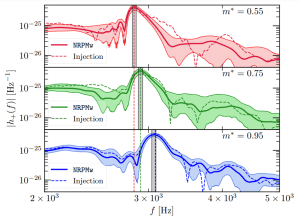
In a recent study accepted for publication in The Astrophysical Journal Letters (see arXiv:2302.11359), we explore finite-temperature effects in numerical-relativity simulations of binary neutron star mergers with microphysical equations of state and full neutrino transport. By increasing the specific heat through controlled changes to the effective nucleon masses, we find that merger remnants become colder and more compact due to the reduced thermal pressure support.
This effect leaves an imprint on the post-merger gravitational wave signal via a shift in the peak frequency. We use a full Bayesian analysis to demonstrate that these shifts in frequency are distinguishable with next-generation gravitational-wave observatories at signal-to-noise ratios of 15.